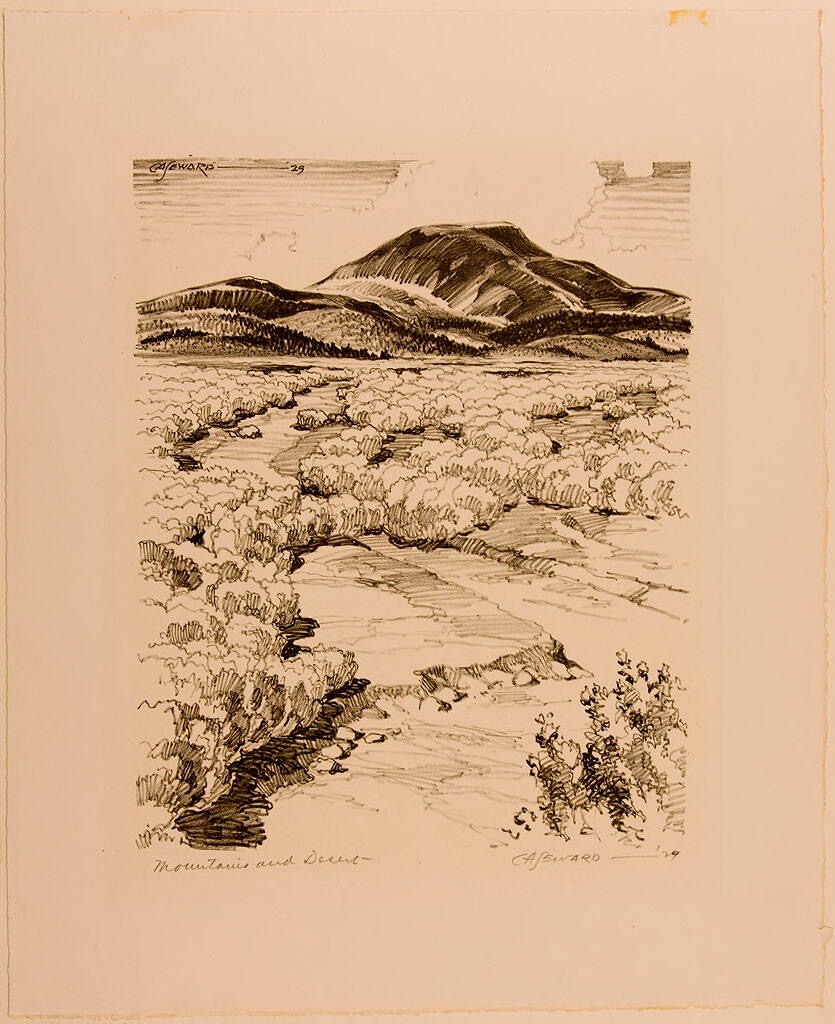GreatBasin

Coy Aron Seward: Mountains and Desert (1929)
"We'll be on to someplace different before then."
At first, The Muse didn't believe me when I told her we would be toodling through a part of the country where rivers don't drain to the sea. Vast areas of the inner mountain west feature no outlet to any ocean. Whatever moisture falls there either evaporates or easily slips into the thin rocky soil. Whatever runoff proves too voluminous accumulates into salt lakes or sinks where it becomes unusable for irrigation or potage. Seasonally, much of the landscape sees moisture, especially if the winter, like this one, proves snowy. In late Winter, just before Spring, the landscape seems remarkably well-watered. What looks like a greasewood desert might be slough, a few inches deep in slow water from upland snow melt. Sheep might graze there for a few weeks before being herded into the higher country to finish their season.
Our little dish bowl valley would be a basin were it not open to drainage. Once we slip over the edge and head South, we're climbing into the high country where snowmelt streams flow green and hopeful to feed the mighty John Day River. Eventually, we cross over near Strawberry Mountain to enter The GreatBasin. The Symphony channel provides the background music, a Brandenberg Concerto, as we slip over another snowy pass and down into an almost trackless desert. A hundred miles evaporates like nothing there. The usual toodling rules are suspended in favor of local customs. The Schooner purrs contentedly across high desert valleys. There's gratefully not a breath of wind.
In midsummer, this travel would doubtless prove terrible. In late winter, it seems ideally suited to whatever we'd expected. Whatever flow pulled us out of our usual drainage guides us toward someplace challenging to explain. The scenery seems stupendous. How could it be that we'd never heard of these places? The Muse exclaims that one broad valley seems every bit as magnificent as Monument Valley, but it's tucked up in an isolated corner of The Steens Mountains, essentially inaccessible except by accident. We're the beneficiaries, and we won't try to convince anybody to attempt to follow where we've traveled. We just had to be there for any of this to happen. We thought we were going to our declared destination, but it turned out that we were also going here, near the center of nowhere, at the bottom of a GreatBasin that never intended to drain anything anywhere else.
We gain a fresh appreciation of where we came from. This whole GreatBasin world seems rough and tumble, inhabited exclusively by soiled doves. Houses seem much worse for the wind here. The gas station attendant didn't know which road we should follow heading out of Burns. "I haven't traveled enough yet to know," he said. He might never travel enough, for in that country, one might not need knowledge of whatever might have been downstream had any stream been headed anywhere different. None ever were. Even the cranes, like us, only pass through here on the way to somewhere else.
This country seems too ancient to put up with us for long. A full moon will rise as we reach our hotel, and an old Basque restaurant will make us supper. "It's traditional to eat the beans off the top of your salad," the helpful waitress suggested, so we ate our beans off the top of our salad just as if we were locals. But we're from country that eventually flows to the sea. Territory where our salmon at least try to return to the snow-swollen stream they were spawned in. Where I, too, returned to my native stream there, for my homeland was open to the ocean and connected to the rest of this vast and distracting world. This GreatBasin Country seems sequestered. I suspect it was never intended to be conquered and has been struggling to reclaim itself since. A great wind's predicted for tomorrow, with heavy snowfall, which will quickly melt before flowing into the great sink at the bottom of this basin. We'll be on to someplace different before then.
©2024 by David A. Schmaltz - all rights reserved


